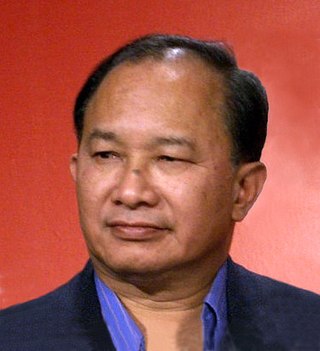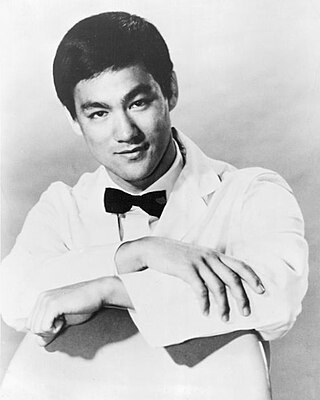Robert Chua Wah-Peng | |
|---|---|
蔡和平 | |
 | |
| Born | 20 May 1946 |
| Spouse | Yam Peng-peng (m. 1974) |
| Website | www |
Robert Chua Wah-Peng (born 20 May 1946) is a Singaporean broadcaster and businessman.
Robert Chua Wah-Peng | |
|---|---|
蔡和平 | |
 | |
| Born | 20 May 1946 |
| Spouse | Yam Peng-peng (m. 1974) |
| Website | www |
Robert Chua Wah-Peng (born 20 May 1946) is a Singaporean broadcaster and businessman.
Born in 1946 in Colony of Singapore, [1] on 20 May 1946,[ citation needed ] he has worked internationally in Australia, Hong Kong and China as well. Among other activities in his career, he was part of the launch of television production company TVB in 1967; the creator of Enjoy Yourself Tonight , the longest-running "live" variety show in Hong Kong; and the founder of satellite television channel of China Entertainment Television (CETV). [2] [3] [4]

Hong Kong is a special administrative region of China. With 7.4 million residents of various nationalities in a 1,104-square-kilometre (426 sq mi) territory, Hong Kong is the fourth most densely populated region in the world.

John Woo Yu-sen is a Hong Kong film director known as a highly influential figure in the action film genre. The recipient of various accolades, including a Hong Kong Film Award for Best Picture, Best Director, and Best Editing, as well as a Golden Horse Award, an Asia Pacific Screen Award and a Saturn Award, he is regarded as a pioneer of heroic bloodshed films and the gun fu genre in Hong Kong action cinema. He is known for his highly chaotic "bullet ballet" action sequences, stylized imagery, Mexican standoffs, frequent use of slow motion and allusions to wuxia, film noir and Western cinema.

Bruce Lee was a Hong Kong-American martial artist, actor, filmmaker, and philosopher. He was the founder of Jeet Kune Do, a hybrid martial arts philosophy formed from Lee's experiences in unarmed fighting and self-defense—as well as eclectic, Zen Buddhist and Taoist philosophies—as a new school of martial arts thought. With a film career spanning Hong Kong and the United States, Li is regarded as the first global Chinese film star and one of the most influential martial artists in the history of cinema. He is known for his roles in five feature-length martial arts films in the 1970s: The Big Boss (1971), Fist of Fury, The Way of the Dragon, directed and written by Lee, Enter the Dragon (1973) and The Game of Death (1978). Lee is credited with helping popularize martial arts films in the 1970s and promoting Hong Kong action cinema.

Sir Run Run Shaw, also known as Shao Yifu and Siu Yat-fu, was a Hong Kong businessman, filmmaker, and philanthropist. He was one of the foremost influential movie moguls in the East Asian and Hong Kong entertainment industry. He founded the Shaw Brothers Studio, one of the largest film production companies in Hong Kong, and TVB, the dominant television company in Hong Kong.

Television Broadcasts Limited is a television broadcasting company based in Hong Kong. The company operates five free-to-air terrestrial television channels in Hong Kong, with TVB Jade as its main Cantonese language service, and TVB Pearl as its main English service. TVB is headquartered at TVB City at the Tseung Kwan O Industrial Estate.

Stanley Ho Hung-sun was a Hong Kong and Macau billionaire businessman. He was the founder and chairman of SJM Holdings, which owns nineteen casinos in Macau including the Grand Lisboa.
Disney Networks Group Asia Pacific was a Hong Kong–based commercial broadcasting company operating multiple specialty television channels. The company was founded in 1991 by Hong Kong businessman Richard Li.

Zheng is a Chinese surname. It is the 7th name on the Hundred Family Surnames poem. In 2006, Zheng ranked 21st in China's list of top 100 most common surnames. Zheng belongs to the second major group of ten surnames which makes up more than 10% of the Chinese population. Zheng was a major surname of the rich and powerful during China's Tang dynasty.
Cantonese is the traditional prestige variety of Yue Chinese, a Sinitic language belonging to the Sino-Tibetan language family. It originated in the city of Guangzhou and its surrounding Pearl River Delta.
Chopsocky is a colloquial term for martial arts films and kung fu films made primarily by Hong Kong action cinema between the late 1960s and early 1980s. The term was coined by the American motion picture trade magazine Variety following the explosion of films in the genre released in 1973 in the U.S. after the success of Five Fingers of Death. The word is a play on chop suey, combining "chop" and "sock".
Hong Kong action cinema is the principal source of the Hong Kong film industry's global fame. Action films from Hong Kong have roots in Chinese and Hong Kong cultures including Chinese opera, storytelling and aesthetic traditions, which Hong Kong filmmakers combined with elements from Hollywood and Japanese cinema along with new action choreography and filmmaking techniques, to create a culturally distinctive form that went on to have wide transcultural appeal. In turn, Hollywood action films have been heavily influenced by Hong Kong genre conventions, from the 1970s onwards.

The Korean Wave or Hallyu is a cultural phenomenon in which the global popularity of South Korean popular culture has dramatically risen since the 1990s. Worldwide interest in Korean culture has been led primarily by the spread of K-pop, K-dramas and films, with keystone successes including K-pop groups BTS, Blackpink, television series Squid Game (2021), and Oscar-winning film Parasite (2019). The Korean Wave has been recognized as a form of soft power and as an important economic asset for South Korea, generating revenue through both exports and tourism.

Animax is an Asian pay television channel owned by KC Global Media Asia. The channel was originally owned by Sony Pictures Entertainment, and took its name from the Japanese satellite TV network; which was then-majority owned by subsidiary Sony Pictures Entertainment Japan. The channel would be sold to its current owners on January 1, 2020.
China Entertainment Television (CETV) was a Mandarin Chinese-language satellite television channel in the Greater China region, owned jointly by TOM Group and the United States’ TBS Networks. The broadcaster was originally based in Kowloon Tong, Hong Kong, but moved to Shenzhen, China in 2003.

Phoenix Television is a majority state-owned television network that offers Mandarin and Cantonese-language channels that serve mainland China, Hong Kong, Macau, and other markets with substantial Chinese-language viewers. It is headquartered in Shenzhen and Hong Kong. It is also registered in Cayman Islands.
Tiger parenting is a form of strict parenting, whereby parents are highly invested in ensuring their children's success. Specifically, tiger parents push their children to attain high levels of academic achievement or success in high-status extracurricular activities such as music or sports. The term "tiger mother" was brought to public attention by Yale Law School professor Amy Chua in her 2011 memoir Battle Hymn of the Tiger Mother.

Fox Sports Asia was a pan-Asian pay television network broadcasting in Asia, operated by Fox Networks Group Asia Pacific, a subsidiary of The Walt Disney Company Pte. Ltd. It also oversaw a version of Star Sports available in Mainland China and South Korea. Originally launched in early 1990s as Star Sports and ESPN by Satellite Television Asian Region and ESPN International respectively, both parties agreed to combine their operations in Asia in October 1996. News Corporation took the full control of the venture in 2012, and relaunched the channels in two phases in January 2013 and August 2014, respectively.
Leong Po-Chih is a British-Chinese film director. He has worked in England, Hong Kong, and the United States.
Chinese Voice is a Cantonese, Mandarin and English language radio network based in Auckland, New Zealand. It is a wholly owned subsidiary of Best News Entertainment, an Asian language television, print and radio company, and consists of three station set up between 2003 and 2010. It produces more than 80 hours of local content each week, including live talkback on news stories, migrant issues, political developments and dealing with New Zealand Government agencies. The stations also broadcast imported talk and music programmes from China and Hong Kong.

Star China Media, also known as Star (CM) Holdings, is a Chinese media company owned by China Media Capital. The company operates television channels Xing Kong and Channel V Mainland China, and maintains Fortune Star film library.